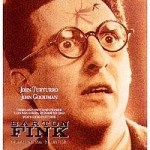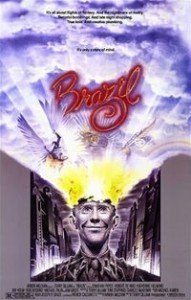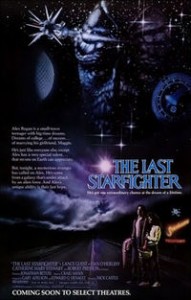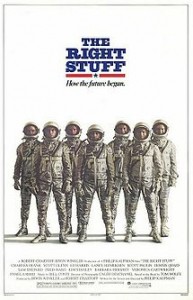The concept is simple: come up with a list of great films that didn’t do well at the box office or ones you’ve been told are great and you’ve said to yourself, “Yeah, I should see that,” but you never get around to it. Originally when I was tinkering with such a list over ten years ago I included The Shawshank Redemption (1994), Hoosiers (1986), and Silverado (1985), but enough people have since discovered those movies on home video that I won’t include them here. But if you still haven’t seen those three or anything on the following list, by all means check them out!
 Barton Fink (1991). The Coen brothers’ take on writer’s block and peeling wallpaper won Best Director (Joel Coen), Best Actor (John Turturro), and the grand prize — the Palme d’Or — at the 1991 Cannes Film Festival. John Turturro plays a New York playwright hired to write screenplays in 1940s Hollywood. While struggling to write a wrestling picture, the studio puts him up in a run-down hotel where he meets his next-door neighbor, an insurance salesman played by John Goodman. And then, in that typical Coen brothers way, it gets deliciously weird.
Barton Fink (1991). The Coen brothers’ take on writer’s block and peeling wallpaper won Best Director (Joel Coen), Best Actor (John Turturro), and the grand prize — the Palme d’Or — at the 1991 Cannes Film Festival. John Turturro plays a New York playwright hired to write screenplays in 1940s Hollywood. While struggling to write a wrestling picture, the studio puts him up in a run-down hotel where he meets his next-door neighbor, an insurance salesman played by John Goodman. And then, in that typical Coen brothers way, it gets deliciously weird.
 Brazil (1985). Think of it as George Orwell meets … well, Terry Gilliam. The director’s take on an Orwellian bureaucracy almost never got released in the U.S. The story is the stuff of Hollywood legend: Universal said the picture was unreleasable. They wanted to completely recut it and change the concept of the entire ending, so Terry Gilliam conducted private screenings against the studio’s wishes. Members of the Los Angeles Film Critics Association attended one of the screenings and voted Brazil best film of the year. Universal then relented and gave it a theatrical release, albeit reluctantly. But beware — the abbreviated, 94-minute cut of Brazil is sometimes shown in syndication, so if you’ve only seen it on TV, chances are you’ve seen the screwed-up version.
Brazil (1985). Think of it as George Orwell meets … well, Terry Gilliam. The director’s take on an Orwellian bureaucracy almost never got released in the U.S. The story is the stuff of Hollywood legend: Universal said the picture was unreleasable. They wanted to completely recut it and change the concept of the entire ending, so Terry Gilliam conducted private screenings against the studio’s wishes. Members of the Los Angeles Film Critics Association attended one of the screenings and voted Brazil best film of the year. Universal then relented and gave it a theatrical release, albeit reluctantly. But beware — the abbreviated, 94-minute cut of Brazil is sometimes shown in syndication, so if you’ve only seen it on TV, chances are you’ve seen the screwed-up version.
California Split (1974). This often overlooked Robert Altman film is a character study of two compulsive gamblers, wonderfully played by Elliott Gould and George Segal. There’s a lot of poker playing in this movie, yet in typical Altman fashion, not one actual hand of poker is shown — the focus is on the people, not the cards. All this plus the usual Altman touches (improv, long takes, and overlapping dialogue) make California Split the most realistic account of gambling I’ve ever seen.
Excalibur (1981). John Boorman’s definitive telling of the King Arthur legend is a smart, eloquent feast for the eyes. Nicol Williamson gives a wonderfully eccentric performance as Merlin, and Helen Mirren is simultaneously seductive and detestable as Arthur’s half sister, Morgana. Boorman and Rospo Pallenberg’s screenplay tells the story with verisimilitude and none of the Hollywood bullshit you get with other versions.
 The Last Starfighter (1984). Video gamer Alex Rogan (Lance Guest) breaks the record on a Starfighter arcade game in his trailer park, unaware he’s secretly being “recruited by the Star League to defend the frontier against the Kodan armada.” The film’s only liability: computer-generated effects circa 1984 make the “real” space battles look more like a video game. Refreshingly, the true special effects here are the story and characters.
The Last Starfighter (1984). Video gamer Alex Rogan (Lance Guest) breaks the record on a Starfighter arcade game in his trailer park, unaware he’s secretly being “recruited by the Star League to defend the frontier against the Kodan armada.” The film’s only liability: computer-generated effects circa 1984 make the “real” space battles look more like a video game. Refreshingly, the true special effects here are the story and characters.
Punch-Drunk Love (2002). A romantic comedy from Paul Thomas Anderson? The end result is as dark, edgy, and strangely sweet as you’d expect from the guy who made Boogie Nights, Magnolia, and There Will Be Blood. If you require proof of Adam Sandler’s acting ability, here it is — it’s actually difficult to imagine anyone else in this role. Sandler plays a hapless small-business owner with seven overbearing sisters and serious anger-management issues, and Emily Watson is the woman of his dreams, who also happens to share his fetish for some very unusual pillow talk. Only Anderson would dare to use a song from Robert Altman’s 1980 musical version of Popeye (Harry Nilsson’s “He Needs Me”) to such great effect.
 The Right Stuff (1983). Hard to believe, but this Best Picture nominee was a box-office flop. Writer-director Philip Kaufman’s adaptation of Tom Wolfe’s book is a funny, soaring tribute to the original Mercury astronauts as well as their wives (apparently, being married to a test pilot also requires “the right stuff”). The ensemble here is a long list of great actors: Ed Harris, Scott Glenn, Barbara Hershey, Dennis Quaid, Fred Ward, and Sam Shepard, just to name a few.
The Right Stuff (1983). Hard to believe, but this Best Picture nominee was a box-office flop. Writer-director Philip Kaufman’s adaptation of Tom Wolfe’s book is a funny, soaring tribute to the original Mercury astronauts as well as their wives (apparently, being married to a test pilot also requires “the right stuff”). The ensemble here is a long list of great actors: Ed Harris, Scott Glenn, Barbara Hershey, Dennis Quaid, Fred Ward, and Sam Shepard, just to name a few.
Seven Days in May (1964). The Manchurian Candidate (1962) gets all the acclaim, but my favorite John Frankenheimer thriller of the ’60s is this little gem about a possible military coup to overthrow the U.S. government. Burt Lancaster is the general who may or may not be behind it all, Kirk Douglas is the colonel who uncovers the conspiracy, and Fredric March is the president who supports nuclear disarmament, which the military sees as a threat to the safety of the nation. Add a riveting screenplay by Rod Serling to the mix and you have a first-rate conspiracy thriller.
The Taking of Pelham One Two Three (1974). I write this without having seen the recent Tony Scott remake, but still — skip it and see the original instead. One thing they did really well in the ’70s was make great no-nonsense thrillers, and Joseph Sargent’s Pelham One Two Three is one of the great underrated thrillers of that decade. Plus it’s really hard to beat that funky 12-tone score by David Shire. For a great write-up on this film (along with a review of the remake), check out Bob Cashill’s No Concessions column from June 19.

![Reblog this post [with Zemanta]](http://img.zemanta.com/reblog_e.png?x-id=c12f25ec-f462-42d0-a491-167dadcb9153)



Comments